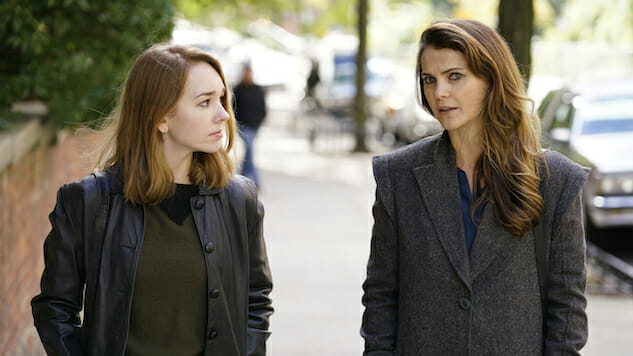
Though it’s named for the composer of “None but the Lonely Hearts, Op. 6, No. 6”—an apt description of Elizabeth (Keri Russell), certainly, in an hour dominated by her numerous operations—the music cue from “Tchaikovsky” that resonates most is Talking Heads’ “Slippery People,” and not simply for its reference to the characters’ many guises. In a fresh, foot-tapping set piece, one that wordlessly, efficiently maps a complex process for passing information by X-ray in an airport bathroom, Stan (Noah Emmerich) watches his source, Gennadi Bystrov (Yuri Kolokolnikov), from a safe distance, and it’s the song—which bleeds into Elizabeth’s risky business at the Department of State—that signals where The Americans is going with this. For both Stan and Elizabeth, after all, the political implications of their missions remain obscure, or impossible to know; the “backlsidin’” of the lyrics seems more important here, the ease with which they slip into the rhythms of their awful work.
This interest in the meaning of work, both its cost and its worth, is the central feature of “Tchaikovsky,” elaborated in so many contexts that the episode maintains its focus despite covering an immense amount of narrative terrain. There’s Stan explaining to Aderholt (Brandon J. Dirden) that his move from the FBI’s Counterintelligence Division to run-of-the-mill “murderers, drug dealers, and corrupt politicians” has been a godsend, yet becoming newly embroiled with Gennadi and his wife, Sofia (Darya Ekamasova). There’s Philip (Matthew Rhys), anxious and distracted at the travel agency, and soon upset over the loss of a client, sounding so depressed on the phone that even Henry (Keidrich Sellati)—not the most observant child in TV history, clearly—picks up on it. And then there’s Elizabeth, in conversation with Claudia (Margo Martindale), sniffing at the artist (Miriam Shor) in her care. “I don’t know why people spend their life doing that,” she says, unable to appreciate the woman’s sketches. “At least her husband is doing something.”
The lines comes as Elizabeth, seen first in profile—reclining, with Claudia in the background, as if she were at an appointment with her therapist—sits up, the camera closing in on her face for emphasis: That something, with its differing definitions, is essential to the modern self-conception, and the episode’s examination of multiple forms of work refuses to adhere to one perspective. Against Elizabeth’s distaste for art’s wasted energies (at least as she sees it), “Tchaikovsky” sets her patient’s challenge to “draw the dark parts” of a two-toned mug, or Claudia’s appreciation for the only composer she could listen to after the trauma of the war. Against the temptations of tradecraft, the excitement both Stan and Philip seem likely to seek out as the season proceeds, Elizabeth, in almost the same breath, reassures herself that Paige (Holly Taylor), will “have it better” than her parents, and asks Claudia to finish Paige’s training should Elizabeth come to an untimely end.
That she nearly does, as part of the “Dead Hand” plan set in motion last week, leads to one of the most arresting cliffhangers in The Americans’ run, with Elizabeth growling at her daughter to go back to the car, half of her face splattered with her contact’s gray matter. The image is an unforgettable one, though much of its power stems, I suspect, from its setup—the sequence, set to Tchaikovsky, in which Elizabeth denies to Paige that KGB agents use sex to glean sensitive intelligence (a flat-out lie), grants that relationships with sources sometimes become sexual (not quite the whole story), and finally confesses, with regard to the rumors Paige describes, “I’m cut off from everyone else” (the God’s honest truth). Elizabeth’s admission underscores The Americans’ long-held belief that the personal and the professional are inseparable, that the meaning of work—its cost, its worth—is always colored by other factors, by sex, affection, politics, patriotism, and much more besides. In fact, I’m cut off from everyone else might be seen as the thrust of the hour’s Mad Men-esque opening, as Philip, in his most dapper suit, casts a wary glance at his wife, forlornly descending the stairs for a cigarette, or its mid-episode reprise, when Elizabeth sighs, of her trial by fire in the family trade, “I learned fast.”
Whether it’s useful to compare Philip and Elizabeth Jennings to Don and Betty Draper—or Paige to Sally, or Henry to Bobby—there’s something to the way The Americans, after a fifth season so profoundly sensitive to the points of contact among kin and country, labor and love, has become a funhouse mirror of Matthew Weiner’s capitalist classic, in which colleagues at Sterling Cooper and its descendants formed a sort of family, and family so often felt like work. Consider, then, that Elizabeth, perhaps the slipperiest person on television, begs for her life—or at least buys time to save it—by telling her contact that she has two children, or that Paige violates protocol because she fears for her mother: In The Americans, work and family are nearly one in the same, and it’s that slipperiness that suddenly seems so dangerous.
Matt Brennan is the TV editor of Paste Magazine. He tweets about what he’s watching @thefilmgoer.